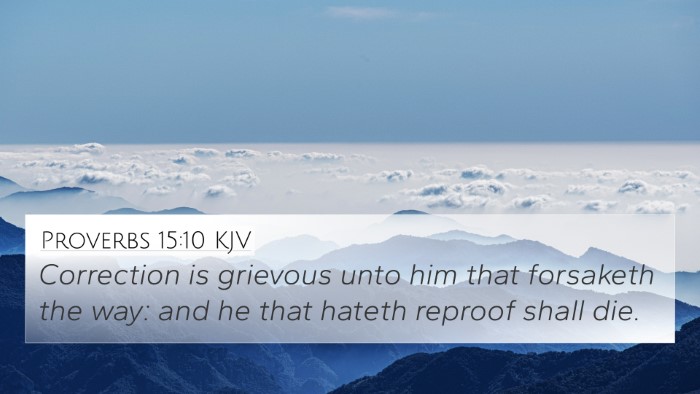Understanding Proverbs 15:12
Proverbs 15:12 states, "A scoffer does not love one who reproves him; he will not go to the wise." This verse provides a profound insight into the nature of scoffing and the attitudes of those who resist correction. Below, we will explore various interpretations and insights from well-known public domain commentaries, linking related scriptures for a comprehensive understanding.
Insights from Commentaries
-
Matthew Henry:
Henry emphasizes the character of the scoffer, noting that such individuals are resistant to correction. He points out that their disdain for reproof stems from a prideful heart that refuses to acknowledge fault or learn from wisdom.
-
Albert Barnes:
Barnes sheds light on the consequences of being a scoffer. He highlights that those who mock or refuse instruction remain in their ignorance and are cut off from the wisdom that could guide them away from folly.
-
Adam Clarke:
Clarke adds a psychological dimension to the verse, suggesting that a scoffer would rather remain in their current mindset than face the discomfort of correction. His view extends the notion that the company of wisdom is rejected due to the inner turmoil of being held accountable.
Theological Themes
This verse fits into broader biblical themes regarding the importance of wisdom and the role of reproof in spiritual growth. It serves as a reminder that humility and a willingness to learn are essential traits of the wise.
Related Bible Cross-References
Here are some Bible verses that relate to the themes present in Proverbs 15:12:
- Proverbs 12:1: "Whoever loves discipline loves knowledge, but whoever hates correction is stupid."
- Proverbs 13:1: "A wise son hears his father’s instruction, but a scoffer does not listen to rebuke."
- Proverbs 9:8: "Do not reprove a scoffer, or he will hate you; reprove a wise man, and he will love you."
- Proverbs 1:7: "The fear of the Lord is the beginning of knowledge; fools despise wisdom and instruction."
- Proverbs 15:32: "He who ignores discipline despises himself, but whoever heeds correction gains understanding."
- 2 Timothy 3:16: "All Scripture is God-breathed and is useful for teaching, rebuking, correcting and training in righteousness."
- James 1:19: "Know this, my beloved brothers: let every person be quick to hear, slow to speak, slow to anger."
Connecting Themes: Disdain for Correction
Proverbs 15:12 speaks not only to individual behavior but also taps into a broader discourse on the nature of wisdom throughout the Bible. The resistant nature of the scoffer indicates a serious spiritual deficiency:
- In comparing Proverbs 9:8 with Proverbs 15:12, we see the thread of how wisdom is received either with love or hatred.
- The disregard for correction is further echoed in Proverbs 1:7, which illustrates the eternal conflict between wisdom and folly.
- This cycle of rejection and resistance also connects to New Testament teachings on the nature of reproof, as seen in 2 Timothy 3:16, showcasing the ongoing relevance of wisdom and correction across both Testaments.
Tools for Understanding These Cross-References
Utilizing various tools can enhance your study and understanding of Proverbs 15:12 and its related themes:
- Bible Concordance: Essential for locating specific verses and identifying themes.
- Bible Cross-Reference Guide: Helps to create connections across scriptures, enriching personal study.
- Cross-Reference Bible Study: Engaging in these studies can lead to a greater understanding of biblical themes.
- Bible Reference Resources: These can provide deeper insights and different translations of key verses.
Conclusion
Proverbs 15:12 challenges readers to engage with wisdom and reproof constructively. It underscores the importance of humility and the readiness to learn from correction, which leads to a deeper understanding of spiritual truths. As one reflects on this verse and its connections through cross-references, they can develop a more holistic view of wisdom as presented throughout the Bible.










